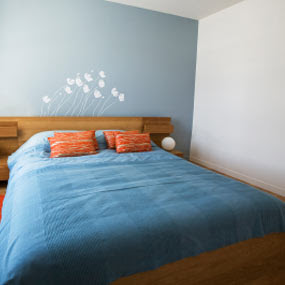Trouble getting to bed at night? You're not alone.
According to the National Sleep Foundation, more than
13% of American adults report problems sleeping. And there isn't much that's
more important to your overall health than good sleep. Luckily, for many, a
good night's rest is only a few short steps away. Cure your insomnia by
redesigning your room for maximum tranquility.
Choose the
Right Color
The color you paint your bedroom walls and the colors you
use to decorate can affect the way you feel inside your room and, ultimately,
can affect your sleep. Studies have shown that subdued shades of blue and green
can elicit feelings of relaxation, calmness, comfort, peace, and hope. Other
lighter colors such as peach and tan may also help calm your senses before
bedtime.
Get the
Right Bed
When you're spending almost a third of your lifetime in your
bed, it makes sense to commit the time and money needed to make sure it meets
your needs. When it comes to beds, there's no one-size-fits-all. Find a store
that lets you test a mattress for 30 days before buying. Test out different
mattresses and pillows to select the right size and firmness for you. If you're
waking up stiff or sore, try a new mattress or pillows.
Turn Down
the Light
It seems obvious, but making sure your room is dark enough
is essential to a night of quality sleep. Turn off or block all light sources,
and make sure that you have curtains or blinds on your windows; even street
lights and moonlight can wake you up if you're a light sleeper. If you need
some light to fall asleep, don't just use any old lamp; get a night light or
dimmer switch-controlled lamp that will emit soft, gentle light
Turn the
Clock
A simple but effective adjustment to your bedroom layout –
turn your clock so that it faces away from your bed. First of all, if your
clock glows, the low light it emits could affect your sleep. Second, watching
time slowly tick by as you lie in bed will cause mental stress that keeps you
from ever falling asleep.
Get Rid of
the TV And the computer.
Your bedroom should be a place of
sleep and intimacy, and your electronics can affect both of those. Move your TV
out into the living room. If you use your bedroom as a home office, make sure
that when you put away your computer, you can put it out of sight. While you're
at it, make sure there's no soft blue glow coming from your cell phone or iPod
either.
De-clutter
Organize your closet and shelves so that there aren't piles
of clothes and stacks of books lying around your room. Move unfinished projects
out of your bedroom so they don't stress you out when you're getting ready for
bed. An uncluttered room will lead to an uncluttered mind, less distraction,
and easier relaxation.
Clean the Air
Breathing easier will lead to sleeping better. Open the
windows regularly to air out your bedroom and get fresh air in and stale air
out. Try putting an air-purifying plant or a HEPA-filter air-purifying system
in your bedroom to rid the air of toxins and allergens. Finally, consider
aromatherapy; mist your pillow with water infused with lavender, vanilla,
sandalwood, bergamot, or chamomile to soothe your senses before bedtime.
Still Can't
Sleep?
If you've redesigned your bedroom but still lie awake at all
hours of the night, it may be time to take further steps. Here are some small behavioral changes you can make during
the day that pay huge dividends at night. And if those don't work, consider
this comprehensive list of insomnia treatments. No matter what,
don't accept a life without sleep; you deserve better!
Culled from Health line








These seem like great tips, and I am going to try and employ some of them in my routine, especially, de-cluttering, as I need to do that anyhow. I did want to suggest that people consider doing relaxing things before they head to bed. Like reading a book or taking a nice hot shower. I had a Dreamline jetted shower installed because it is super relaxing, and I needed a good way to unwind. When I'm in the shower, my brain can process the day, and I can relax. Usually, after I shower, I throw on my robe, and listen to music.By then, I'm typically ready for snoozeville.
ReplyDeleteYou may not realize it over the course of the night for Better Sleep, but your sleeping position could not be great for your body for Better Sleep—or the quality of shuteye you get. Find out which sleeping style is best for Better Sleep, and make a conscious effort to fix it when you go to bed, and you'll wake up feeling more refreshed in the morning.
ReplyDeleteHey, I even have looking your article and that helped me to put in writing my article about chronic appendicitis back pain you want to have a test on my article.
ReplyDelete